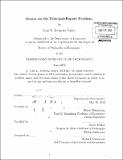Essays on the principal-expert problem
Author(s)
Zermeño Vallés, Luis G. (Luis Guillermo)
DownloadFull printable version (8.252Mb)
Other Contributors
Massachusetts Institute of Technology. Dept. of Economics.
Advisor
Bengt Holmström and Glenn Ellison.
Terms of use
Metadata
Show full item recordAbstract
This dissertation studies the problem of motivating an expert to help a principal take a decision. The first chapter examines a principal-expert model in which the only source of friction is that the expert must be induced to acquire non-verifiable information relevant for the principal's decision. I show that contracts that specify a single transfer scheme are strictly dominated by contracts that specify a menu of transfer schemes from which the expert can choose. Optimal menu contracts often induce inefficient decision-making. Indeed., in environments where decisions affect the amount of information that is revealed ex-post. distorting decision-making in favor of decisions that reveal more information can help to provide better incentives for information acquisition. Without menus, there is an additional reason to distort decision-making. In this case, distorting decision-making is almost always optimal, and the distortions can favor decision that reveal less information ex-post. The second chapter studies the role of authority in a more general version of the principal-expert model studied in chapter 1. Contracts specify a menu of transfer schemes from which the expert can choose. I consider three possible allocations of authority: 1) Full-commitment, under which the expert's choice from the menu also determines the decision to be taken. 2) Expert-authority, under which the expert can ultimately take any decision. 3) Principalauthority, under which the principal can ultimately take any decision. I provide conditions under which any Pareto-optimal outcome implementable under full-commitment can also be implemented when either one of the parties has authority. The third chapter analyzes what happens if the expert is not motivated through a contract, but through his concern about his reputation. The expert can be a charlatan (and have no relevant information) or informed, and he privately knows his type. The principal makes inference about the expert's type based on the expert's report and on the outcome of the decision. I show that the expert's concern about his reputation coarsens the information that he can credibly transmit. As a result, decision-making is biased away from the status quo: the decision that the principal would take under the prior is taken too infrequently.
Description
Thesis (Ph. D.)--Massachusetts Institute of Technology, Dept. of Economics, 2012. Cataloged from PDF version of thesis. Includes bibliographical references (p. 132-136).
Date issued
2012Department
Massachusetts Institute of Technology. Department of EconomicsPublisher
Massachusetts Institute of Technology
Keywords
Economics.